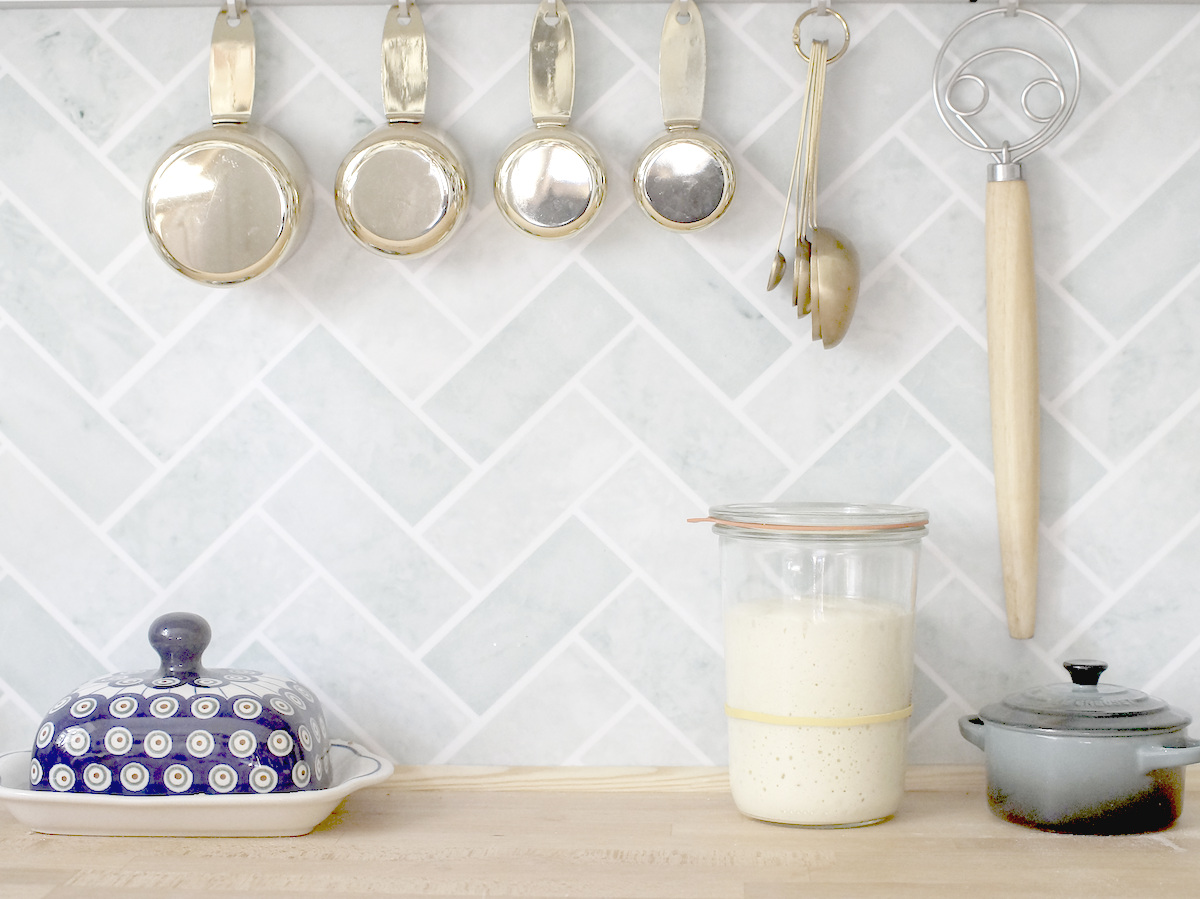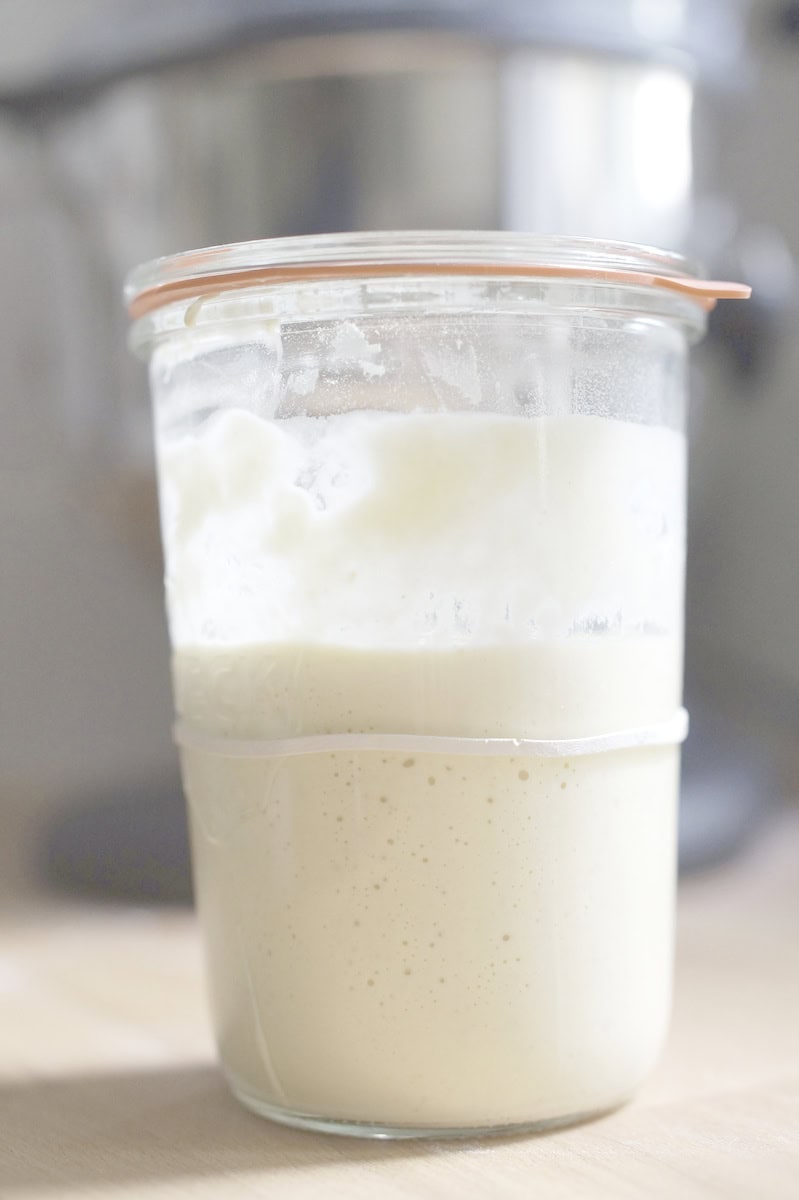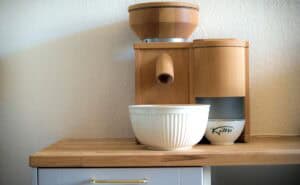welcome to the Grains and Greens Kitchen
I’m so glad you’re here!
This is your starting point for all things sourdough and fresh flour baking. Whether you’re just getting started or looking to refine your process, you’ll find everything you need to feel confident in the kitchen:
- How to grow and maintain a sourdough starter from scratch
- Tips for baking with freshly milled flour
- Handy conversion charts and ingredient swaps
So pull up a chair, grab your favorite mixing bowl, and join me—whether it’s your first loaf or your fiftieth, I’m so glad to have you in the kitchen with me!

Get my free
Grow Your Own Sourdough Starter-Checklist
Want a simple way to stay on track while growing your starter? I’ve created a free printable checklist so you don’t have to second-guess the days (I’ve definitely been there!).
Use it to log feedings, note changes, and celebrate those first bubbles.
It’s perfect for your fridge, your baking journal, or just keeping things stress-free.
03
Converting recipes to freshly-milled flour
Ideally, you want to get the same amount of flour as in the original recipe. For consistent results, you’ll have to weigh your flour and potentially adjust the liquids in your recipe. For every cup of refined white flour (aka all-purpose) listed in a recipe, aim for 130g freshly-milled flour. This is a good starting point.
Below is a chart on how much freshly-milled flour you need to swap into recipes that call for all-purpose flour.
Replacing white flour, cups to grams
|
1/4 cup |
33 g |
|
1/3 cup |
43 g |
|
1/2 cup |
65 g |
|
2/3 cup |
87 g |
|
3/4 cup |
98 g |
|
1 cup |
130 g |
|
1 1/4 cup |
163 g |
|
1 1/2 cup |
195 g |
|
2 cups |
260 g |
|
2 1/2 cups |
325 g |
|
3 cups |
390 g |
Remember that you may need to increase liquids by 5-10%. If you can, let your flour and liquid ingredients sit for 15-30 minutes to hydrate. If it feels too dry after that time you can add a little more liquids.
04
More helpful baking equivalents
I bake in grams, cook in cups, and season to taste — the way it works in my kitchen. But just in case you need a measurement I missed, these conversions and equivalents should have you covered.
|
3 tsp |
1 tbsp |
|
4 tbsp |
1/4 cup |
|
5 tbsp + 1 tsp |
1/3 cup |
cups to ml
|
1 tsp |
5 ml |
|
1 tbsp |
15 ml |
|
1/4 cup |
60 ml |
|
1/3 cup |
80 ml |
|
1/2 cup |
120 ml |
|
2/3 cup |
160 ml |
|
3/4 cup |
180 ml |
|
1 cup |
240 ml |
|
1 1/4 cups |
300 ml |
|
1 1/2 cups |
360 ml |
Butter conversions
|
1 tbsp |
14 g |
|
2 tbsp |
28 g |
|
3 tbsp |
42 g |
|
1/4 cup |
57 g |
|
1/3 cup |
80 g |
|
1/2 cup |
113 g |
|
3/4 cup |
170 g |
|
1 cup |
227 g |
05
Baking pan equivalents
Swapping between baking pans? Loaf pans, muffin tins and square baking pans have the same volume so you can switch between pans if you’re in the mood for something different. Here’s what you need to do to make it work:
Loaf pans:
- use a 20 cm (9×5 inch) loaf pan
- bake at 175°C – 200°C (350°F – 400°F)
- increase the baking time to at least 45 minutes (check for doneness with a toothpick)
Muffin tins:
- use a 12-cup muffin tin
- bake at 220°C (425°F)
- decrease the baking time to about 20 minutes (check for doneness with a toothpick)
Square baking pans:
- use a 20 cm (8 inch) square baking pan or dish
- bake at 180°C (350°F)
- adjust the baking time to about 30 minutes (as always, check for doneness with a toothpick)
06
Other Ingredient Replacements
If you’re missing some key ingredients or need to adjust for special dietary needs in a hurry, don’t panic. Here are some tried and true substitutes for baking:
Replacing eggs
1 egg
- 1 tbsp ground flax seeds or chia seeds + 3 tbsp water
Let sit for 5 minutes to thicken. binds quick breads, muffins, waffles, hearty cookies and brownies. - 3 tbsp aquafaba (liquid from canned chickpeas)
Best in recipes that call for raw eggs (think mayonnaise etc).
1 egg white
- 2 tbsp aquafaba
Great for whipped textures or meringues.
1 egg yolk
- 1 tbsp aquafaba
Works well in rich recipes.
1/2 egg
- 1 egg yolk
Handy when you’re splitting recipes in half.
|
1 egg |
1 tbsp ground flax seeds or chia seeds + 3 tbsp water |
let sit for 5 minutes to thicken. binds quick breads, muffins, waffles, hearty cookies and brownies |
|
3 tbsp aquafaba (liquid from canned chickpeas) |
best in recipes that call for raw eggs (think mayonnaise etc.) | |
|
1 egg white |
2 tbsp aquafaba |
great for whipped textures or meringues |
|
1 egg yolk |
1 tbsp aquafaba |
works well in rich recipes |
|
1/2 egg |
1 egg yolk |
handy when you’re cutting recipes in half |
vegan Sweet Dough
For a vegan sweet dough (like cinnamon buns etc.) replace all dairy milk with soy milk and add an extra 50 ml of soy milk per egg.
Replacing Buttermilk
- Add 1 tbsp of fresh lemon juice or vinegar to a 1-cup measuring cup. Top with any dairy or non-dairy milk. Let it sit for 5 minutes to curdle. For 2 cups of buttermilk, 1 tbsp + 1 tsp of lemon juice or vinegar add enough acidity.
- Mix 1/4 cup milk into 3/4 cup plain yogurt to create a thicker buttermilk substitute. If you’d like to use non-dairy milk and yogurt, add 1/2 tsp lemon juice or vinegar to the mix and stir well.






